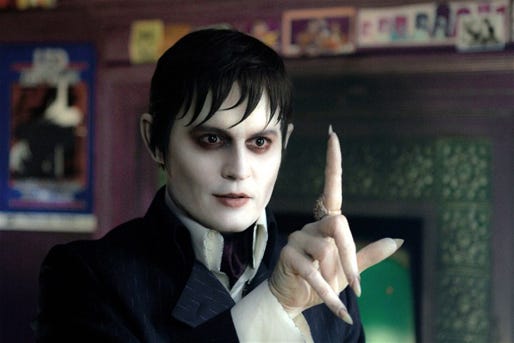Dark Shadows

“Even Aphrodite herself could not construct a more odious union.”
“The Collinses have always held the biggest, most marvelous balls.”
Johnny Depp utters both lines in “Dark Shadows,” adapted for the screen from a 1960s TV series. Split the difference between highbrow eloquence and puerile puns, and you’ll find the middle ground occupied (mostly) with confidence in this eighth collaboration between Depp and director Tim Burton.
Depp and Burton’s coupling has yielded entertaining literary adaptations (“Sleepy Hollow,” “Charlie and the Chocolate Factory”) and three great films (“Edward Scissorhands,” “Ed Wood” and “Sweeney Todd: The Demon Barber of Fleet Street”).
But 2010’s “Alice in Wonderland” was as uninspired as it was successful. Burton buried his wit and style in a barren land of bad CGI. Depp’s reliable embodiment of the misunderstood outsider got lost under bad makeup and a worse accent.
What a relief, then, to see them right their ship even as “Shadows” wobbles at times. Alternating between manic peppiness and mournful romance, “Shadows” instead adheres rather strongly to its soap-opera source material.
It’s inconsequential fun — a juicily entertaining story of family secrets, sex, greed and vanity and tossing in spooky shenanigans and ’70s gags. Only in an overwrought climax of cartoonish CGI does the soufflé collapse.
Hailing from 18th-century Liverpool, the Collins family emigrates England for coastal Maine. Soon, their fishing business becomes a cannery empire in a town that takes on their name, Collinsport, and lets them build the 200-room mansion, Collinwood.
It’s there that scion son Barnabas Collins (Depp) carries on a lusty, but loveless (for him) affair with a busty maid named Angelique (Eva Green). As Barnabas notes, of all the servants to sleep with, he chooses the witch. And when he finds his soulmate in Josette (Bella Heathcote), Angelique murders his parents and his beloved.
She then transforms Barnabas into a vampire — whom she promptly persuades the townspeople to chain and bury. Over two centuries, Angelique cheats death and sends the Collins dynasty into decrepitude via her own successful fish cannery.
Flash to 1972, when Barnabas is exhumed after groundbreaking on a McDonald’s near Collinsport (in a scene that takes an amusing jab at the chain).
Barnabas’s resurrection is, within PG-13 confines, bloody, rough and violent. It’s the first of several jolting moments in Seth Grahame-Smith’s script to remind us Barnabas is a creature who tempers his bloodlust only for his bloodline.
And what a sallow bunch of sad sacks Barnabas finds at Collinwood. There’s modern-day matriarch Elizabeth (Michelle Pfeiffer, shamefully wasted given how few films she does anymore) and her perpetually pissed-off teenage daughter Carolyn (Chloe Grace Moretz).
Then there’s Elizabeth’s gadabout brother, Roger (Jonny Lee Miller), his son David (Gulliver McGrath), who insists he can communicate with his dead mother’s ghost and Dr. Hoffman (Helena Bonham Carter), a psychiatrist treating David whose day-drinking makes her avoid the sun as much as Barnabas.
Bemused by his family’s apathy and his mansion’s disrepair, Barnabas hatches a plan to reclaim pride and prosperity. But he must also decide whether to acquiesce to Angelique’s aggressively resumed quest for his love — especially after he falls for David’s new governess, Victoria (also Heathcote), and Angelique threatens to wipe out what little family he has left.
Thankfully, “Dark Shadows” gives Burton room to roam in practical sets and CGI-assisted seaside visuals that authentic enough to feel the thick, salty Atlantic air.
Jackie Earle Haley’s surly groundskeeper amusingly grumbles that Collinwood is “a bitch to dust.” But it’s a marvelous, meticulous monument to production design that is truly one of Burton’s finest signatures. Kudos to production designer Rick Heinrichs for designing a hulking, intricate mansion with surprising amounts of crannies, nooks and crypts, as well as kicky blasts of retro kitsch a la “Mars Attacks!”
Burton’s acting cohort similarly draws on his strengths of obsessive moodiness. But think Sweeney Todd were he an intermittently happy swinger. Barnabas’s human urges are undead, too.
Thus, Depp plays Barnabas as Edward Scissorhands with an insatiably raging libido — suave in speech, but emotionally arrested and prone to rage. Unsurprisingly, Depp is equally at ease in despondence as when declaring his powers. He also achieves an appropriately spindly and spectral appearance, with a herky-jerky physicality and rigidity akin to “Nosferatu’s” Max Schreck.
And it’s not just Depp’s show. The alluring Green is dangerously sexy — strutting, wiggling and shimmying in ways to make any man or immortal melt. She also occasionally drops her voice into a decrepit register that belies her beauty.
The rest of “Shadows” throws together minor-key melancholy and major-key goofiness. Alice Cooper shows up before the film makes appropriately bleak use of his “The Ballad of Dwight Fry.” A spontaneous comic tryst leads to something sinister. And a goofy-fun sex scene between Barnabas and Angelique is tempered by a poetic visual resolution to their conflict.
About their battle: It manifests itself in a special-effects showcase that needs the feather-light touch of “Death Becomes Her,” not the tromping stampede of “Jumanji.” Plus, a stupendously lame twist for one character and an ill-advised coda dangle unnecessary sequel bait.
No, “Dark Shadows” is best left self-contained and self-assured in its one-and-done presentation of silly-serious storytelling. When Barnabas quotes Steve Miller’s refrain from “The Joker,” he makes it sound just a bit sad. “It’s not Shakespeare,” he utters, and neither is “Dark Shadows” — entertainingly pitched somewhere between a timeless play’s tragedy and a ’70s pop song’s playfulness.


